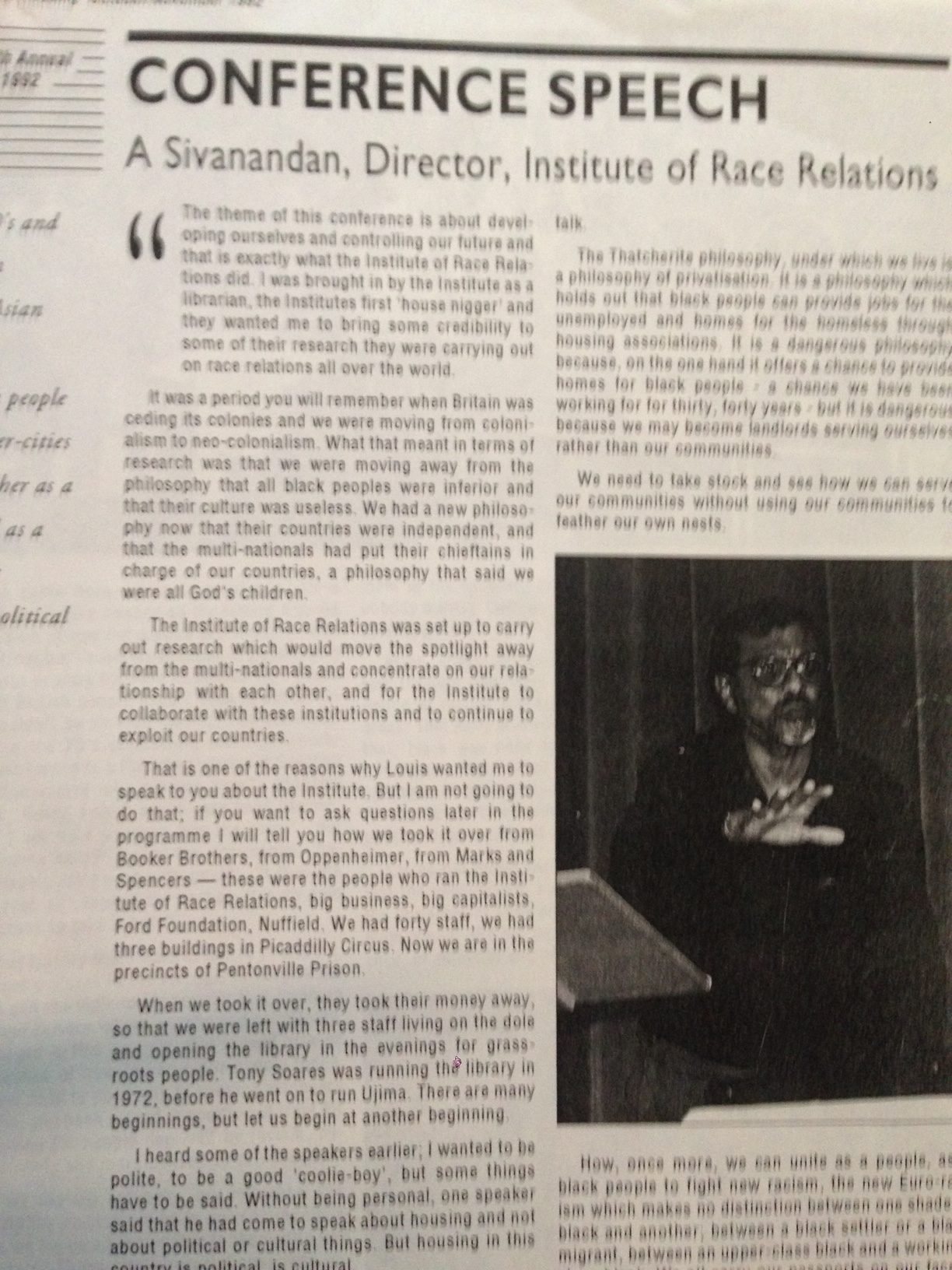A speech to the Federation of Black Housing Associations Ninth annual conference in October 1992 (published in Black Housing, Oct/Nov 1992)
The theme of this conference is about developing ourselves and controlling our future and that is exactly what the Institute of Race Relations did. I was brought in by the Institute as a librarian, the Institutes first ‘house nigger’ and they wanted me to bring some credibility to some of their research they were carrying out on race relations all over the world.
It was a period you will remember when Britain was ceding its colonies and we were moving from colonialism to neo-colonialism. What that meant in terms of research was that we were moving away from the philosophy that all black peoples were inferior and
that their culture was useless. We had a new philosophy now that their countries were independent, and that the multi-nationals had put their chieftains in charge of our countries, a philosophy that said we were all God’s children The Institute of Race Relations was set up to carry out research which would move the spotlight away from the multi-nationals and concentrate on our relationship with each other, and for the Institute to collaborate with these institutions and to continue to exploit our countries.
That is one of the reasons why Louis wanted me to speak to you about the Institute. But I am not going to do that; if you want to ask questions later in the programme I will tell you how we took it over from Booker Brothers, from Oppenheimer, from Marks and Spencer — these were the people who ran the Institute of Race Relations, big business, big capitalists, Ford Foundation, Nuffield. We had forty staff, we had three buildings in Piccadilly Circus. Now we are in the precincts of Pentonville Prison.
When we took it over, they took their money away so that we were left with three staff living on the dole and opening the library in the evenings for grassroots people. Tony Soares was running the library in 1972, before he went on to run Ujima. There are many beginnings, but let us begin at another beginning I heard some of the speakers earlier: I wanted to be polite, to be a good ‘coolie-boy, but some things have to be said. Without being personal, one speaker said that he had come to speak about housing and not about political or cultural things. But housing in this country is political, is cultural.
In the 50’s and 60’s. when ordinary Asian and Afro-Caribbean people in the inner-cities came together as a people and as a class, black became political colour. Roy Evans said that in the 50’s and 60’s we were able to buy houses, because they were cheaper. Bullshit!
Liza Aziz spoke about role models my role models were Malcoim X and Ho-Chi-Minh, and you talk about people on television being our role models! We have come a long way as black people to gather here as people of some authority and power. What shall we do with this power? That is the burden of my home.
The Thatcherite philosophy, under which we live is a philosophy of privatisation. It is a philosophy which holds out that black people can provide jobs for the unemployed and homes for the homeless through housing associations. It is a dangerous philosophy because, on the one hand it offers a chance to provide homes for black people a chance we have been working for for thirty, forty years – but it is dangerous because we may become landlords serving ourselves rather than our communities We need to take stock and see how we can serve our communities without using our communities to feather our own nests.
How, once more, we can unite as a people, as a black people to fight new racism, the new Euro-racism which makes no distinction between one shade of black and another, between a black settler or a black migrant, between an upper-class black and a working-class black. We all carry our passports on our faces.
The only thing we have to fight this racism is our unity. A community divided must fall.
What about culture? Our culture is not some historical regurgitation. Culture is what Amical Cabral once said: “Culture is something that is dynamic vibrant, which takes on a military form, or a social form to overthrow the oppressor.” That is the dynamics of culture which you must relate to: that is the culture which we have built in this country. We must return to this culture and see what guidelines it has provided for us, guidelines for black managers, for housing associations.

